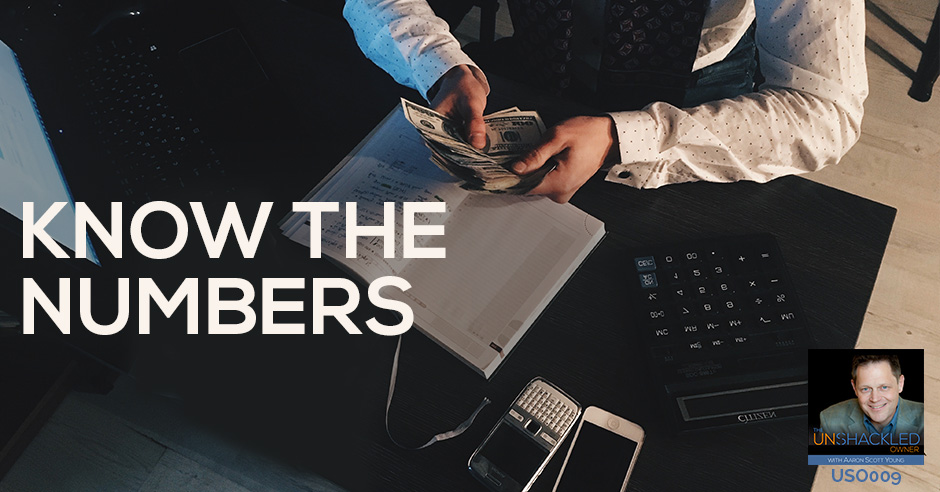
Welcome to the Unshackled Owner Podcast. I want you to be thinking about some of the practical elements that go into running a business. Today, I want to talk about a few things that are very, very practical about money. I want to talk to you today about some of the things that you need to be focusing on your business so that you can actually have some money, have some control, know what the heck you’re doing.
Listen To The Episode Here
Know The Numbers
Hello. Welcome to The Unshackled Owner episode nine. This is the show where we teach you how to build a business that is bigger than you are, how to build a business that becomes an asset not just a glorified job, but a real asset, something that you could sell, something that operates even when you’re not there. I’ve talked in some past episodes about some philosophical things, about taking chances, about having a vision, about stepping out, about taking risk, about being imperfect and so on. That’s fantastic. Those are all things I really want you to be thinking about.
In addition to those things, I want you to be thinking about some of the practical elements that go into running a business. Because if you want to be an unshackled owner, I guess you can be an unshackled owner who’s unshackled by everything. You have no home, no car, no money to bog you down. You can just wander the earth as a vagabond I suppose. But that’s not what really I think most of you are looking for. Everybody that’s following this podcast and that follows me is trying to figure out, “How do I have money? How do I have success? How do I own it, it doesn’t own me?”

Know The Numbers: Napoleon Hill said, “Money without brains is always dangerous.”
I want to talk today a little bit about money and about finances. Napoleon Hill who’s brilliant, if you haven’t read Think and Grow Rich, oh my goodness, get out there and buy it today. Get Think and Grow Rich and read it and learn it. Don’t just read it once, live with that thing. One of the things that he said was, “Money, without brains is always dangerous.”
Today, I want to talk about a few things that are very, very practical about money. We’ll also talk about some conceptual stuff. I want to talk to you today about some of the things that you need to be focusing on your business so that you can actually have some money, have some control, know what the heck you’re doing. I meet entrepreneurs all the time who have these big stories, these big ideas, they’re doing stuff, they’re getting customers, they’re doing jobs for people and so on. Most of them, I shouldn’t say most, but a lot of them, way too many of them, if you ask them about the health of their business, they really don’t have a clue. They don’t know much about it and they don’t really even know where to start to look.l
Some of these are businesses that do, they could be doing a couple million dollars a year in revenue but they’re just treating it like a personal home checkbook. In other words, they have money in the account so they’ll spend money right now. They don’t really know much about the economic or the financial health and well being of their business.
I want to talk about a few things. First of all, if you have only one financial report that you look at on a regular basis, my guess is that there’s a properly organized financial report. If you don’t have properly organized financial reports, we need to talk anyway because you need to get yourself organized. I can introduce you to people that could help you with that. Here’s the thing, if you’re only getting one report, it’s probably your profit and loss statement. A profit and loss is super valuable. Hopefully you’ve all seen one.
This is where at the top of it, it shows all the income, where did all the money come in from, and then it starts to show your operating expenses and it starts to show your cost of goods sold. It goes through all the money that came in and all the money that went out. Then at the bottom of it, it shows either a positive or a negative number. That’s useful. Most people that I meet who do have a P&L, even if it is something as simple as very basic QuickBooks P&L, they get that report, they hit print, they print it out or they look at it on their computer and they go right to the bottom and they say, “Am I positive or am I negative?” That is their barometer on how they’re doing.
Let me tell you right off the bat, it’s an understandable thing to do but it’s an immature way to look at your P&L. Let me just share with you this, your P&L, that number at the bottom is a fantasy number, it’s a fantasy. You can show a profit at the bottom line but that doesn’t mean you really have any money, it doesn’t mean you really have made a profit. All it means is that the way that you’ve booked things, positive and negative on your profit and loss statement came out with that number, whatever that number is.
I’m just here to tell you that the idea that shows a positive profit number at the bottom, you’re in the black, that often, for a lot of companies, does not mean that they have any money. It doesn’t mean they have any money in the bank, doesn’t mean they have anything saved, it doesn’t mean they have any after tax earnings, it doesn’t any of that. All it means is their P&L show that they were in the black.

Know The Numbers: Your P&L, that number at the bottom is a fantasy number, it’s a fantasy.
First things first, that is to say your P&L is useful. If you’re booking things timely and accurately, it will give you a very good idea of where you are. But a P&L and especially that bottom line number is a fantasy so don’t hang your hat on it. You need a good P&L but you need to make sure that somebody else is helping you with your P&L. Unless you’re trained as an accountant or you are a very experienced bookkeeper, I really encourage you to go find someone that you really trust who’s got real experience working with businesses. Not just your uncle or your niece or somebody who does your taxes, I’m talking about somebody who’s really a CPA who works with businesses. Make sure that you are booking things both correctly and timely. P&L, useful but only as good as the information that goes in it and just because it says you’re positive at the bottom line does not actually mean you’re positive. That’s one. You need to be looking at a P&L.
The other thing you need to be looking at is your sales. How are you doing in your sales? Are your sales going up, are they going down? Even if they’re going up or down, it doesn’t necessarily mean that that means you’re making more or less money, what it means is you’re converting prospects into customers at a certain rate. You need to be paying attention to how you take money, assets, turn that into marketing. Those are tools that you send out through advertisements or whatever you’re doing, speaking, trade show booths, whatever you’re doing, you take that marketing effort, you turn that into prospects and then you convert prospects into sales, customers.
What I want you to be doing is really paying attention to how are you doing, what’s your cost of customer acquisition and just how efficient are you at attracting in leads, turning them into prospects, turning prospects into customers. Sales are important. Also, if you have a renewable product, what’s your renewal rate? Do you have a high percentage of renewals, very low percentage? Those are all really important things to figure. I want to make sure that you’re looking at how efficient you are, how good you are at selling stuff. That’s super important.

Know The Numbers: What it means is you’re converting prospects into customers at a certain rate.
Don’t confuse this idea of high price, low price, lots and lots of bonuses, no bonuses at all, retail items. Don’t confuse your pricing to your sales. What we want to do is say, “How good are you at selling stuff?” You need to be tracking that conversion of prospects into customers. Along with that, hopefully, before you ever even made something available for sale, you were looking at your price point, what are you charging for something? You’re looking at your margins and deciding, “If it costs us this much to get the thing and this much to sell the thing, how much do we need to sell the thing for?”
In other words, what’s your acquisition cost? What’s your cost of goods sold? Do you have commissions or anything built into that? Then you’ve got operating costs like maybe your retail space or a website or human beings that you’re paying on payroll. You’ve got other costs associated with being in business, so what price do you have to sell this product for in order to make a profit? Because many people that I meet, they have money moving through their bank account and they’re making sales. They think, “We’re doing this really well.”
Here’s the deal, if all of a sudden, sales stopped for a week or two, how would that affect you? In other words, are you making money? Are you losing money but there’s always cash flow to pay bills? You need to really know, what are my gross margins? Am I operating positively and am I taking best advantage of those gross margins? In other words, are you charging too much so you’re limiting the number of conversions in the sales or are you charging too little, you’re making a ton of sales but you’re leaving a lot of money on the table? This is super, super important.
The other thing I really want you to be paying attention to if you sell physical goods is inventory. I was just recently talking to one of my clients who’s going through The Unshackled Owner program. She was explaining how excited she was about how they’ve sourced a really great manufacturer in another country and they’re going to be having that manufacturer make their physical product, it’s going to increase their gross margins so that they can make more money.
I said, “That’s super awesome.” I said, “Have you thought about what cash you need to have on hand to manage the paying for goods, shipping the goods, the time it takes to ship the goods while you’re selling stuff and then you’re coming back and you’re having to pay all your expenses?” Do you have enough money to go through all three of those phases, through the, “I’ve got inventory on the shelf, I’ve got inventory on a boat and I’ve got inventory being manufactured. Do you have enough money to deal with that cycle that could last three months? How is that going? Do you have the cash on hand you need to have in order to afford your success?
Because as your sales grow, when you’re selling physical product and especially if you’re having it manufactured somewhere, as your sales grow, you’re almost always going to be operating in the negative for a while while you’re growing. Then once you reach equilibrium, then you’ll start to see the profits coming in. While you’re going up, it’s costing you more and more money just to pay to get more product built and shipped so that you can sell it. Are you focused on your inventory, your inventory cost and your cash on hand to manage that?
If you’re selling services, you don’t have that same issue. Basically, as soon as you provide the service, it’s your money. Remember, if you’re selling services, you’re saying, “I’m going to sell you three months or six months worth of coaching,” or you’re going to join this class or you’re going to sell a Mastermind group. I don’t know. Any service thing, you’re going to get paid in advance for something. At Laughlin Associates, we get paid in advance for a number of our services. Just because we got paid in advance does not mean it’s our money.
As a matter of fact, when we’re doing something, we get paid for a year in advance, we’re only being able to book one month of that service at a time. The rest of the money is seen as a liability. That’s unfulfilled work. That’s like saying somebody bought a pair of shoes and we can only send them the shoe laces this month, we still owe them for all this other stuff that we’ve got to produce and give to them. The idea here is you need to really understand how to book that money and that cash flow.

Know The Numbers: . Cash flow is computed by subtracting your operating expenses from the money your company generates.
I keep saying cash flow. I want to talk about that for a minute. Cash flow is not just simply the money that’s progressing through your checking account. First of all, cash is king, cash is the most important thing. The actual cash that you keep after all your expenses, after taxes and so on, your earnings, the money that’s your discretion or your money to do something with to reinvest in the business, to give to charity, to pay yourself more, to invest in some new venture, that’s really the measurement, that’s the gold standard of if you’re successful or not.
Cash flow is basically the number that’s computed by, you subtract your operating expenses from the money your company generates during a normal day or month. Cash flow also includes depreciation of your net income. You’ve got to adjust for working capital and receivables and inventory cost, all that goes into determining your cash flow. When your operating cash, the money that’s inflowing, exceeds the outflow, the money you’re spending to buy inventory, to pay your bills and so on, then that means your in the black. If you’re inflow is greater than your outflow and if you’re spending more than you’re bringing in, then you know you’re probably, not necessarily, you’re probably in the red.
A quote from American Express says, “Sufficient cash flow in your business checking account, especially payroll accounts, is critical.” Small business owners should always make sure they have the necessary cash flow to meet all monthly business expenses. Listen, the other thing I really want you to think about is, a lot of times, small business owners, they’re bringing in money, they get a job, they get some receivables in and then they ad hoc take money out of the business to start to pay themselves something. They’ll take $500 here and $10,000 there and $1500 there, they’ll start paying for some of their bills like their cellphone or their car, whatever out of there.
I really want you to remember, and this is a whole other show that we’ll do another time, I really want you to remember that to be treated like a real business, remember going back a few episodes where we talked about business entities, to be treated like a real business, there’s got to be some predictability and some treating the revenues of the business like a real company would treat the revenue. Part of that is, and one of the things I really want you to be thinking about when you’re thinking about your numbers, is I want you to think about, “How much can I consistently pay myself out of this business?”
I’m not talking about all the bonuses or all the money you can possibly make, but what can you predictably consistently pay yourself out of the business that you could take as payroll and even use a payroll service? I know if you’re only one person paying $150 a month or whatever for a payroll service might seem excessive. I’m going to encourage you to do this because if you are setup as a proper corporation or a proper multi member LLC and you are on payroll, even if it’s only taking $3000 a month out of the company, you get a paycheck and taxes and social security and workman’s comp, all that’s being taken out, your FICA/FUTA, all the stuff that’s all being taken out and you’re getting a net check and you can show a pay stub for one that shows that you’re acting like a real employee of the company.
It’s not just your alter ego as though you’re a sole proprietor. It’s a real paycheck that you’re getting as an employee because remember, you’re not the company and the company’s not you. This is something I talk about in almost all of my talks. I am not the corporation, the corporation is not me. The only way to show that is to act like a real corporation. Part of that is, you as a shareholder is different than you as an employee and you as an employee ought to be getting a paycheck. That paycheck ought to have taxes. You have an obligation to have payroll taxes and so on being deducted out of that and paid to the state.
I’ll tell you what, the fastest way to get yourself in trouble is to not be properly paying your payroll taxes to the state. I’ll tell you what, that will get you in trouble faster than almost anything else in business, is not keeping up on your payroll taxes. Remember, money without brains is dangerous. Part of that is you got to know the law, you got to know the rules. You must follow them if you want to be safe and protected. Part of that is, treat yourself like an employee. Remember, you have one job as shareholder, another job as director and then a different job as employee. Even if you’re the president, you’re an employee of the company.

Know The Numbers: “Rich people constantly learn and grow. Poor people think they already know.”
If all this is is freaking you out and you’re going, “Yeah, yeah. But I’m small or I’m having a hard time with …” I want you to remember this, there’s an old quote that says, “Rich people constantly learn and grow. Poor people think they already know.” If you’re sitting, you’re going, “Aaron, that doesn’t really matter. Whatever.” I’m just going to tell you that you’re walking through a minefield. I’ve seen so many companies get creamed because they just thought they could skirt around these basic issues that are the law, that are the rules. If you want to be in business, you must know the rules and you must follow the rules. If you don’t, you’re going to have real trouble.
Sometimes it’s hard to do this stuff. Sometimes you think, “I don’t know. I’m having a hard time. I’m not doing stuff consistently. I’m struggling. I don’t have time to make a P&L because I’m just trying to get another sale. I don’t really know much about marketing so I’m constantly going to these meetup groups and I’m working my butt off just to try to make a few bucks.” I’m telling you, when you learn the rules and you follow them, you will eventually have success. Success isn’t always easy.
Another Napoleon Hill said, “Most great people have achieved their greatest success just one step beyond their greatest failure.” When I hit my rock bottom, which was sentenced to go to prison for something I knew I was not guilty of, leaving my family, leaving my business, thinking, “Who’s ever going to trust me again?” I was at my deepest, deepest well of despair. I bounced out of that. We’ve been doing better every year since we went through our lowest point.
In Think and Grow Rich, he talks about being three feet from gold. Most people stop just three feet away from the gold vein when they tell that story about Darby and being three feet from gold. There’s a real thing folks, about acting like a real business owner and knowing your numbers and treating yourself as an employee of the business and understanding that just because you own it doesn’t mean that you deserve a whole lot of payroll right now.
There’s so many people that do this like it’s a hobby. They don’t really act like it’s a real business. They’re the ones that always crash and burn. It’s always the ones who just try to do it ad hoc. They crash and burn. Stay focused on your core business, know what your numbers are and then as you know what your numbers are, just follow them and be really, really smart about how you deploy your actual real earnings. It’s not about the money flowing through the bank account, it’s about the money you get to keep, that you get to have as discretional money.
When you understand that, pretty soon you will own the world. Remember the guy that talked to me, and I’m sure I’ve told that story in one of the podcasts where I said, “What are the tricks to becoming a man of your wealth, a billion dollars?” He said, “Live within your means. Buy low, sell high.” Know your numbers, buy low, sell high. Of course, if you’re standing in line, you’re probably in the wrong place.
That’s it today from The Unshackled Owner. Know your numbers, do smart things, like I say in a lot of my speeches. Come back and see us again next week. Like, share, do this. Between now and then, you keep looking up and I’ll keep looking out.
- AaronScottYoung.com
- The Unshackled Owner Twitter
- The Unshackled Owner Facebook
- Aaron Scott Young LinkedIn



